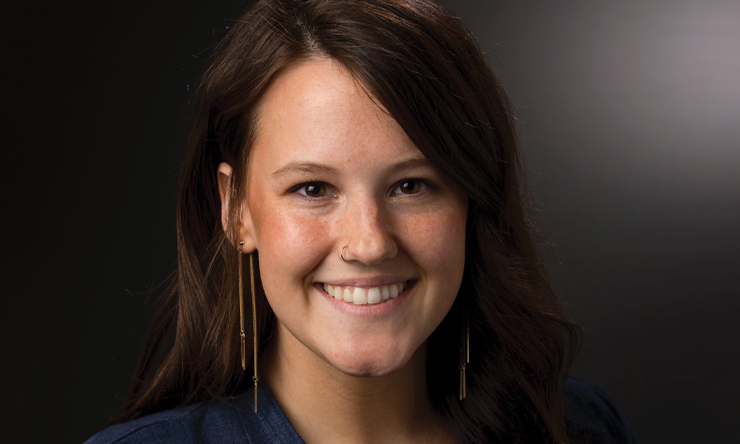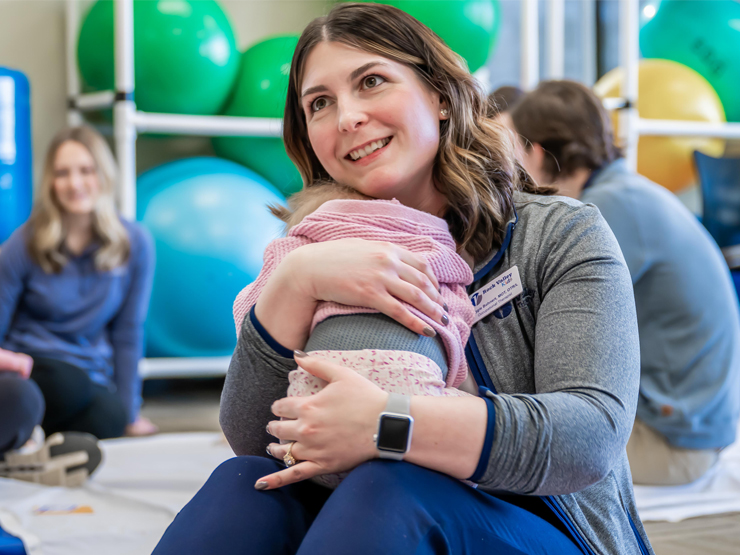Scene Magazine | Spring 2010
St. Ambrose will be recognized as a leading Midwestern university rooted in its diocesan heritage and the Catholic Intellectual Tradition. Ambrosians are committed to academic excellence, the liberal arts, social justice and service.
So reads St. Ambrose University's vision, a declaration that emerged from discussions among more than 200 members of the Ambrose community, including faculty members, staff, students, board members and alumni. One of its most unique features is the commitment to social justice. How is social justice defined, though, and how did it become such an integral part of this university? To find out, Scene sat down with Katy Strzepek, director of St. Ambrose's Women's Studies program; Msgr. Marvin Mottet '52, a former teacher at St. Ambrose and lifelong activist; and Katie Van Blair '92, '05 MSW, associate professor and director of the St. Ambrose School of Social Work.
Scene: Msgr. Mottet, could you tell us a bit about how social justice took root at St. Ambrose?
Msgr. Mottet: Well, of course, the Great Depression had a big impact on everybody, just to survive. During those days a lot of Ambrose priests came out of working class families, their dads probably worked in factories and were union organizers and they had that in mind. At least in my experience, whatever class I went to I got social justice. If it was Father Urban "Penny" Ruhl in English literature, you got social justice. If it was philosophy, history, it didn't matter, you got social justice, so it was always woven in there as a thread running through. Also, there was Young Christian Students that Father Bernard Kamerick led. It had weekly meetings and we would also go to Chicago for big YCS meetings. As students we got to meet all these priests in Chicago involved in race and justice and inner city issues. And my first year here, Ambrose hosted the National Catholic Social Action Conference. They called off classes for a day or two and all the students were invited to go. We got to meet all these outstanding people and hear all their talks.
Scene: It seems like there has been a history of bringing speakers to campus who have had an impact on students.
MM: Yes, it motivates them. One of the things St. Ambrose did, we were the first to bring John Howard Griffin, author of "Black Like Me," in to speak. Peter Maurin, one of the co-founders of the Catholic Worker Movement, he came. And the other co-founder, Dorothy Day, whenever she passed through town, she stopped here. One of our priests even gave her his car to drive back home in.
Katy Strzepek: The Pacem in Terris award given by the diocese has been a significant forum to continue that impact. Students get to see these amazing peace and justice leaders come to St. Ambrose. Every time the award is given, they see the difference an individual can make in furthering social justice.
Scene: Could you describe what we mean when we talk about "social justice"?
Katie Van Blair: At its essence, it is about acknowledging the inequalities in society and working to alleviate them. One speaker we had, anti-racism activist Tim Wise, described privilege as being born on third base and thinking you hit a triple. Social justice is knowing that society is set up unequally and working toward change.
KS: And social justice is looking for equality in the long term. I think an important distinction between charity and justice is that charity is giving something to somebody for their basic needs now. With social justice, you are hoping for long-term alleviation of inequalities. It makes you think about relationships. Why is it that so many people are so poor and so many people are so rich?
KVB: This reminds me of your "Two Feet of Social Ministry" document, Msgr. Mottet. Long-term solutions is one foot, direct service to people in need is the other. The idea of charity versus advocacy was certainly central when we as a university were talking about our social justice vision.
Scene: Why does it matter that our students be exposed to issues of social justice and become engaged in them?
KVB: Well, the first thing that comes to my mind is Catholic social teaching. It calls us to action. Because of our history at St. Ambrose and because of the diocesan connection and community connection, I think we are uniquely poised to do that.
KS: I think so, too. I loved it when I heard your talk at the civil rights event, Msgr. Mottet, about Father Joseph Cardijn's method of observe-judge-act, because that is so much of what I try to teach my students to do in my class. First, observe. Think about how things are affecting people from different walks of life. Then you can try to make some judgments that aren't based on your own preconceptions. And finally, take action! That is authentic learning. Otherwise we are doing our students a disservice if we are just teaching them about all these sad and depressing things in the world without teaching them there are things they can do. We have to ask them, "How can you change this?"
KVB: And to teach that, together, we're stronger. As a university, we're stronger that way, too.
Scene: This leads to the next question: When asked what students can do to make the most of their time at Ambrose, another social justice leader at St. Ambrose, Father William Dawson, says the first thing is to find the good teachers and take their classes.
MM: Yes, he and I agree on that. Sign up for professors, not classes. I taught high school at Assumption
for nine years, and what I saw was how average students, when they came to St. Ambrose, one professor would inspire them. Then they would just take off, go on to graduate school, do work for their communities. Of course, when I was a student, I was also inspired by another student who told me I ought to read the book "Fishers of Men." I got it from the library, and it had a big impact. So students have a role, too.
Scene: The next thing Father Dawson recommends is students get involved with organizations like Amnesty International, Pax Christi, and Project Renewal. How can we encourage students who learn about social justice in class to connect with these organizations?
KS: In my class we always do some kind of project to become involved. For example, in my modern Africa class for the past couple of years we've done a project about Darfur, learning about the genocide there, and then the students give a public presentation. They've done a letter writing campaign. I try to teach them skills to be an activist so they can apply those skills to whatever social issues they want to change: how to get publicity for your cause, how to teach others about it, how to get funding. They learn that even a small group of people can make a difference, like Katie said, and they start feeling connected to a larger world. And I love what Msgr. Mottet said. Sometimes we have students who may face some challenges academically, but they are compassionate. When you give them the ability to excel and help others, it can be really transformational for those students.
MM: We call it service learning. When we started Project Renewal, Ambrose students were a big part of that, and faculty, too. The founder, Sister Concetta Bendicenti, lived in a convent at St. Mary's Parish before she started Project Renewal. After that, she and the staff chose to live among the people in the neighborhood they served. She used to have ordinary middle-class people come down to visit, too. She'd sit at the kitchen table and have a cup of coffee with them, and she would explain to them what was going on in the neighborhood.
What are the problems there. What are the incomes. It was a kind of immersion. You have to have an experience. If you are looking at it from the outside, your eyes are opened to a new reality.
Scene: What do you think the challenges facing our students are today as they engage with social justice?
KVB: Just getting involved in something bigger is challenging. Right now there is a lot of online advocacy happening that doesn't take much effort, where you click and post on Facebook that you support breast cancer research. Not that it's bad, but we would like people to be inspired to do more. On the other hand, there are also all kinds of great opportunities for people across the world to connect electronically in terms of social movements. So for us as professors the challenge is teaching how to do that, how to organize an online campaign and know people are actually supporting it, versus just sending it on. It's a challenge but also a potentially exciting use of our resources now.
KS: I think one other challenge, too, as you said Msgr. Mottet, is having students really sit down with the community they are working with so that they find out what that community's needs are instead of coming in and saying, "As students of St. Ambrose, we think you need this." There is a real danger to that. So we need to teach a model where students are really listening to the community or whoever they are serving to find out what they need.
Scene: Katy, you mentioned Darfur. So many of the social justice issues we talk about today are really global issues. When we talk about students' need to engage with the people they are serving to come up with effective solutions, how do they do that on a global level?
KS: We've had so many more of our students study abroad, more than ever before. Those students come back completely transformed. For example, I had a student who just went to Botswana to volunteer in an orphanage for orphans with AIDS, and through this she learned a lot about the difficulties. Or, the other great thing is to have speakers come in to Ambrose from other places.
KVB: We have worked really hard to bring a global perspective to our students. Through an interdisciplinary group called Ambrose Women for Peace and Justice, for example, we bring in speakers from global organizations or activists with a global perspective. Students can connect with them even if it is not feasible to study abroad. The other thing that professors try to do is talk about how global is local. We're really connected to everyone, so integrating international understanding into everything is also a local understanding.
MM: It goes back to that old saying, "Think globally, act locally."
News
Share This Story



